

P. T. Barnum (Documentary) National Institute of Circus Arts. The story of the circus. National Institute of Circus Arts. Catholic history of Mardi Gras, Fat Tuesday, Lent and Ash Wednesday. Won from the hardest carnival game! A Series of Unfortunate Events #9: The Carnivorous Carnival. "OLIVIA AND THE SCHOOL CARNIVAL" - Olivia Read Aloud - Storybook for kids, children. How Two Bit Circus is turning its 21st century carnival into one giant game. ThrowThrow out the term “amusement park,” and it conjures up visions of roller coasters and rides and costumed characters in massive, franchise-themed lands. But inside a warehouse in the downtown arts district of Los Angeles, a company called Two Bit Circus is building its own idiosyncratic riff on the idea, focused on the power of games. Aside from a sign and some carnival-style light bulbs, the exterior of the self-styled “micro-amusement park” doesn’t seem all that remarkable.
It’s a brick-faced building, a few blocks from a Blue Bottle Coffee, and across the street from a popular LA filming location that’s popped up in everything from Ferris Bueller’s Day Off to Agent Carter. But stepping inside the park itself is like being whisked away into another world. There’s a video arcade, a steampunk carnival midway, and a section devoted to virtual reality experiences. But to see it as simply a collection of games is missing the point entirely. The 21st Century Carnival. Carny. American slang term for carnival employee Etymology[edit] Carny is thought to have become popularized around 1931 in North America, when it was first colloquially used to describe one who works at a carnival.[2] The word carnival, originally meaning a "time of merrymaking before Lent", came into use around 1549.
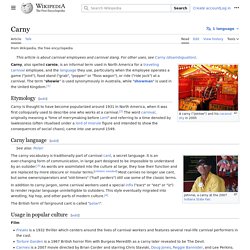
Carny language[edit] In addition to carny jargon, some carnival workers used a special infix ("earz" or "eez" or "iz") to render regular language unintelligible to outsiders. This style eventually migrated into wrestling, hip hop, and other parts of modern culture.[4] The British form of fairground cant is called "Parlyaree". Usage in popular culture[edit] Film Television Music Literature Theater Other See also[edit] References[edit] Eyeing the Flash: The Making of a Carnival Con Artist, by Peter Fenton (Simon & Schuster, 2006 [paperback version]) Further reading[edit] Lewis, Arthur H. (1970). External links[edit] Traveling carnival. A travelling funfair has many attractions, including adult or thrill rides, children's rides, and sideshows consisting of games of skill, strength, or luck.
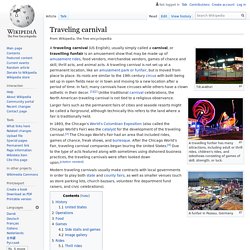
A funfair in Passau, Germany. Definition, History, Acts, & Facts. After Ricketts’s death the popularity of the circus waned in the United States, although certain troupes had sporadic success during the early 19th century.
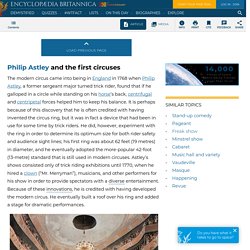
The European circus of Pepin and Breschard, for instance, was well received at the turn of the century. It was also about this time that the popularity of exotic animals was noted by exhibitors, with the arrival of the first elephant on the North American continent in 1796. The animal, owned at first by Captain Jacob Crowninshield (and recorded in history only as “Crowninshield’s elephant”), became the first elephant to be exhibited with a circus when it joined the Cayetano, Codet, Menial & Redon Circus of New York in 1812. The second elephant on American shores, Old Bet, was even more popular and is credited with having established the circus tradition of the animal menagerie. History of Circus - From Ancient to First Modern Circus. Carnival, Its Origin and Evolution. Pulse - History and Culture of Carnival. Carnival: origins of the world’s biggest party.
How To Promote An Event: 10 Tips For Promoting Your Event. Chapter Three: How To Promote An Event By now, this event management cycle should be familiar to you: Planning the event: From idea to action plan.

Organising the event: From action plan to execution. Promoting the event: Spreading the word and selling tickets. Carnivals. Carnival in the United States has very different connotations to that of European or Caribbean traditions of carnival.
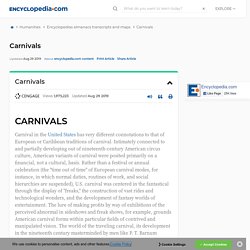
Intimately connected to and partially developing out of nineteenth-century American circus culture, American variants of carnival were posited primarily on a financial, not a cultural, basis. Rather than a festival or annual celebration (the "time out of time" of European carnival modes, for instance, in which normal duties, routines of work, and social hierarchies are suspended), U.S. carnival was centered in the fantastical through the display of "freaks," the construction of vast rides and technological wonders, and the development of fantasy worlds of entertainment. The lure of making profits by way of exhibitions of the perceived abnormal in sideshows and freak shows, for example, grounds American carnival forms within particular fields of contrived and manipulated vision.
World's Fairs Culture. CIRCUSES: WHAT ARE THE ISSUES? Despite difficulty in assessing living conditions, animal management practices and animal behaviour in circuses, it is evident the impact of life in circuses on animal welfare can be extremely serious.
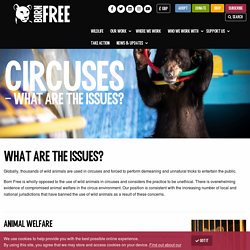
By their very nature, travelling circuses operate in such a way as to facilitate ease of frequent transport. Animals are transported from location to location in cramped conditions, repeatedly loaded and unloaded. They are often subjected to poor living conditions; confinement for long periods; lack of privacy; restricted movement (through chaining and tethering); extreme temperatures; unnatural close contact with people (trainers, performers, and public); high noise levels; and abusive training methods. Animals used in circuses can experience both mental and physical suffering. Carnival EYFS. This is one of four units designed to be delivered at any, or all three of the stages of Primary school.
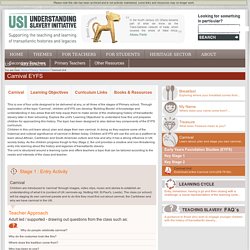
Through exploration of the topic 'Carnival', children at EYFS can develop 'Building Blocks' of knowledge and understanding in key areas that will help equip them to make sense of the challenging history of transatlantic slavery later in their schooling. Explore the unit's 'Learning Objectives' to understand how this unit prepares children for approaching this history. Classic School Carnival Activities - PTO Today. Activities that actively engage kids are the heart of a school carnival or festival.

These are the tried-and-true carnival games and activities that schools rely on year after year. School Carnival Games With Prizes Cakewalk: This is an easy, beloved activity that utilizes volunteers and often works as a lucrative fundraiser. Parents make or buy single-serving sweet treats such as cupcakes or bags of cookies. With music playing, kids walk around a course marked with numbers, stars, or pictures. Ring toss: There are many variations on this simple classic. FREE Carnival Game Ideas - Carnival Activity Booth Ideas Too!